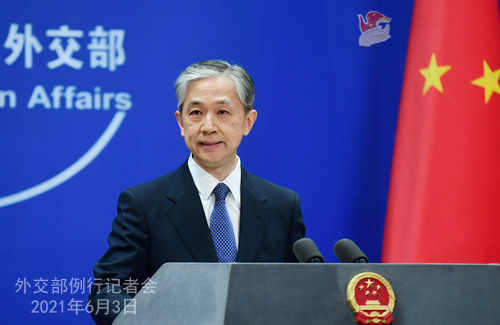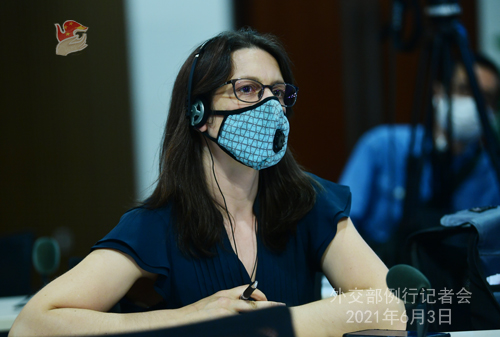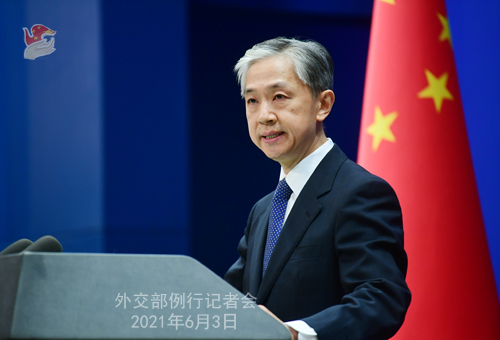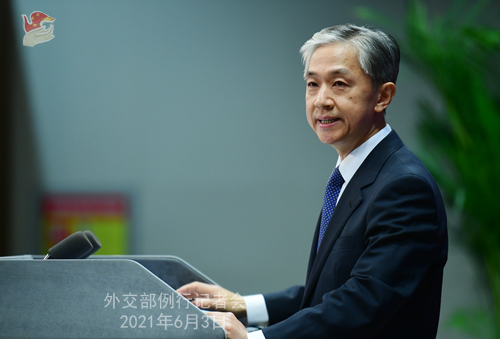| Foreign Ministry Spokesperson Wang Wenbin's Regular Press Conference on June 3, 2021 |
| 2021-06-03 20:05 |
|
CCTV: Jalina Porter, Principal Deputy Spokesperson of the US State Department, said on June 2 that "some progress has been made" in JCPOA talks in Vienna, but it "isn't going to be a quick or easy process". Iranian President Hassan Rouhani said that the main issues between the two sides have been resolved and that there will be further negotiation on minor issues. How would you comment on the result of this round of talks? Wang Wenbin: At present, important progress has been made in talks on resuming compliance with the JCPOA and all relevant parties have demonstrated the political will to reach an agreement. Meanwhile there are still some differences that will need to be bridged through arduous negotiation. China hopes that all parties concerned will rise above distractions, act with greater urgency, make bold political decisions at an early date and work to resolve remaining issues in a flexible and practical manner. China always believes that the key to secure breakthroughs in the negotiations is to have a right perspective on what's right and what's wrong. The root cause of the Iranian nuclear crisis is the US' unilateral withdrawal from the JCPOA and "maximum pressure" on Iran. The US side should revoke all unilateral sanctions on Iran and third parties and Iran should resume full compliance on this basis. China has always participated in the negotiations in a constructive manner and played an important role in pushing all parties to pool consensus and resolve differences. We will continue to make efforts to reach an agreement at an early date, uphold the international non-proliferation system, and safeguard peace and stability in the Middle East. In the meantime, we will firmly uphold our own legitimate rights and interests. BBC: I'd like to ask about the Uighur Tribunal taking place in London tomorrow. Witnesses giving evidence there have told BBC that they've experienced torture and abuse while being detained in Xinjiang. What's your comment? Wang Wenbin: The so-called "Uyghur Tribunal" is neither legal nor credible. It is just another anti-China farce concocted by a few individuals. The government of the Xinjiang Uyghur Autonomous Region has made response in detail. In fact, this so-called "tribunal" has nothing to do with the law. It attempts to run in the name of "tribunal" to engage in anti-China political and public opinion manipulation. This is nothing but an insult on the law. The fake tribunal rallies a group of individuals who make a living by working against China. It is funded by the World Uyghur Congress, an organization dedicated to separating Xinjiang from China. Its "Chair" Geoffrey Nice reportedly used to be a senior British agent. In 2019, he served as the so-called "Chair of the China Tribunal" which staged anti-China farce. He is known for filing frivolous lawsuits, and has close ties with different anti-China forces. The so-called "experts" and "witnesses" include some frequently cited names such as the Australian Strategic Policy Institute(ASPI) and Adrian Zenz, who have long been spreading Xinjiang-related lies, as well as several "actors" who have been found to be habitually fabricating all sorts of "persecution" stories that never happened. The "trial" in question staged by this group of people will carry no more weight than a show. Such behaviour of trifling with the law will only make it easier for the world to see through the despicable lies and rumors relating to Xinjiang.
China Review News: According to media reports, French President Emmanuel Macron and German Chancellor Angela Merkel both said on May 31 that wiretapping between allies was unacceptable in response to allegations that the US National Security Agency (NSA) used Denmark's Defence Intelligence Service (FE) to spy on top European politicians. Officials from Sweden and Norway also voiced criticism. What is China's comment on this? Wang Wenbin: If the US allies find its spying behavior unacceptable, the world would only feel more strongly about it. When it comes to stealing secrets, the US always ranks the first in the world. The amount of means it applies in doing so is mind-boggling. It simulates signals of base stations to tap into and steal data from cell phones. It turns mobile apps into surveillance units. It breaks into cloud servers. It taps into the undersea cables. It installs secretive signals intelligence collection facilities in nearly 100 U.S. embassies and consulates worldwide for spying purpose. The recent media disclosure of how the US spies on its European allies is just the tip of the iceberg of its huge global network for secret stealing. The US owes the international community an explanation. For years and years, the US, while using its technological advantages for massive and indiscriminate eavesdropping on the world, wantonly suppresses law-abiding foreign enterprises under the pretext of national security. Such a two-faced behavior fully exposes its hypocrisy and hegemonic nature. Who on earth is stealing information? And who is the real threat? People have every reason to suspect that the purpose of the US-initiated "clean network" program is to retain its monopoly in the high-tech field and serve as an excuse to justify its espionage activities. Will this "clean network" become another "spying network" in the hands of the US? The US must immediately stop its illegal act of massive and indiscriminate eavesdropping, and stop the dirty business of suppressing other countries' enterprises under the guise of national security. The US must pay off the long-overdue debt it owes the world. RIA Novosti: The New York Times reported that the computer system of New York Metropolitan Transportation Authority was infiltrated by a suspected Chinese-linked hacking group. I wonder if China has any comment? Wang Wenbin: I'm not aware of what you mentioned. I reiterate that China firmly opposes and combats cyber attacks and cyber theft in all forms. This position is consistent and clear. We've stated on multiple occasions that given the virtual nature of cyberspace and the fact that there are all kinds of online actors who are difficult to trace, identifying the source of cyber attacks is a complex technical issue. We hope that relevant sides will adopt a professional and responsible attitude and underscore the importance to have enough evidence when identifying cyber-related incidents, rather than make groundless speculations and allegations.
Bloomberg: President Joe Biden plans to amend a U.S. ban on investments in companies linked to China's military. The new order that Biden is expected to sign this week will change the criteria for blacklisting entities to capture those that operate in the defense or surveillance technology sectors. How concerned are you that the new blacklist will be broader than the previous ones? And how will China respond? Second question, Budapest will rename the streets surrounding the planned campus of a Chinese university to protest against the project, which Hungary's opposition says is emblematic of Prime Minister Viktor Orban's drift from western democratic values. Does the ministry have a comment on this? Wang Wenbin: On your first question, the previous US administration put in place an investment ban on so-called companies with links to the PLA in total disregard of facts the real situation in certain companies. The move severely disrupted normal market rules and order. It not only undermined the lawful rights and interests of Chinese companies but also hurt the interests of global investors including those in the US. The US should respect rule of law and the market, correct its mistakes, and stop actions that undermine the global financial market order and investors' lawful rights and interests. China will take necessary measures to firmly safeguard Chinese enterprises' legitimate and lawful rights and interests and support them in defending their rights and interests according to law. With regard to your second question, joint education programs undertaken by domestic and foreign institutions have become a common model of international educational cooperation nowadays. It helps promote cultural exchange and mutual-learning between countries. China-Hungary relations are growing with a robust momentum with fruitful results in practical cooperation delivering benefits to both countries and peoples. The attempt of certain Hungarian politicians to attract attention and impede China-Hungary cooperation by hyping up China-related issues is utterly despicable. China Daily: It is reported that on June 1 local time, the Tokyo Electric Power Company (TEPCO) again found leakage of wastewater containing radioactive caesium that exceeds the limit for 76 times in a waste container in Fukushima nuclear power plant. On June 2, environment groups in Gyeongsangnam-do mobilized over 100 fishing ships to hold the launching ceremony of the initiative themed "stop the ocean release of Japanese nuclear wastewater from Fukushima - Gyeongnam in action" and urged the Japanese government to cancel the plan to discharge the nuclear contaminated water into the sea. Do you have any comment? Wang Wenbin: I noticed that recently there are many media reports on the leakage of nuclear contaminated water from Fukushima and excessive radioactive substances are detected in sea food in Fukushima. This exposes the incompetency and loopholes of the handling of nuclear contaminated water by TEPCO and the Japanese government. It also fully shows that the disposal is a very complicated issue with far-reaching impact which requires an extremely prudent and responsible attitude. It is an extremely irresponsible, selfish and hasty move of Japan to unilaterally decide to release the Fukushima nuclear contaminated water into the sea before exhausting all safe ways of disposal, without fully disclosing relevant information or fully consulting with neighboring countries and the international community. To make things worse, Japan took another wrong step forward by obstinately sticking to the ocean release plan despite doubts and opposition from home and abroad. We once again ask Japan to revoke the wrong decision, shoulder due responsibilities and come back to the right track of reaching a consensus with all stakeholders and relevant international institutions through full consultation, in stead of continuing to be a trouble-maker.
BBC: Are you saying that the witnesses that are giving evidence and who say that they have been tortured and abused are liars and actors even before you've heard their testimony? Wang Wenbin: As I just said, this so-called "tribunal" has nothing to do with law. It is just a political show and anti-China manipulation under the guise of law. You will find many of the so-called "experts" and "witnesses" cited by this institution quite familiar, like the ASPI and Adrian Zenz. These institutions and individuals are engaged in fabricating Xinjiang-related lies to smear and attack China. This has been fully exposed by the Chinese side as well as international media and experts. Information from such an institution and such a bunch of individuals with no academic worth or integrity will only lay bare the real intention of anti-China forces to smear and attack China. CCTV: The China-CEEC High-level Conference on Forestry Cooperation was held on June 2. Do you have more details on that? Wang Wenbin: The third China-CEEC High-level Conference on Forestry Cooperation was held through video link yesterday. Senior representatives in the forestry sector of 16 countries including China, Slovenia and others attended the conference. Austria and the EU attended the event as observers. Surrounding the theme of the important role of forests and the forestry sector in bioeconomy, the meeting points out that China and Central and Eastern European countries (CEECs) have respective characteristics and advantages in forestry resources management, timber processing and wood-structure architecture, which means there's enormous potential for cooperation in various fields of forest bioeconomy. China and the CEECs will further strengthen cooperation and coordination to promote the development of forest bioeconomy and contribute to mitigating climate change and realizing the Global Forests Goals set out by the United Nations Strategic Plan for Forests 2017–2030 and the United Nations Sustainable Development Goals. The China-CEEC cooperation mechanism has yielded fruitful results and delivered tangible benefits to people of all relevant countries since its establishment nine years ago. Under the China-CEEC forestry cooperation mechanism launched in May 2016, sound cooperation has been conducted in such areas as policy dialogue, scientific research and education, trade in forestry products and forestry investment. As we mark the China-CEEC Cooperation's Year of Green Development and Environmental Protection this year, China stands ready to strengthen exchange and cooperation with CEECs, boost the growth of forest bioeconomy, continue to share opportunities and cooperation outcomes, and strive for steady and sustained progress in China-CEEC cooperation.
|
| |||||||||||||||
|
|||||||||||||||






